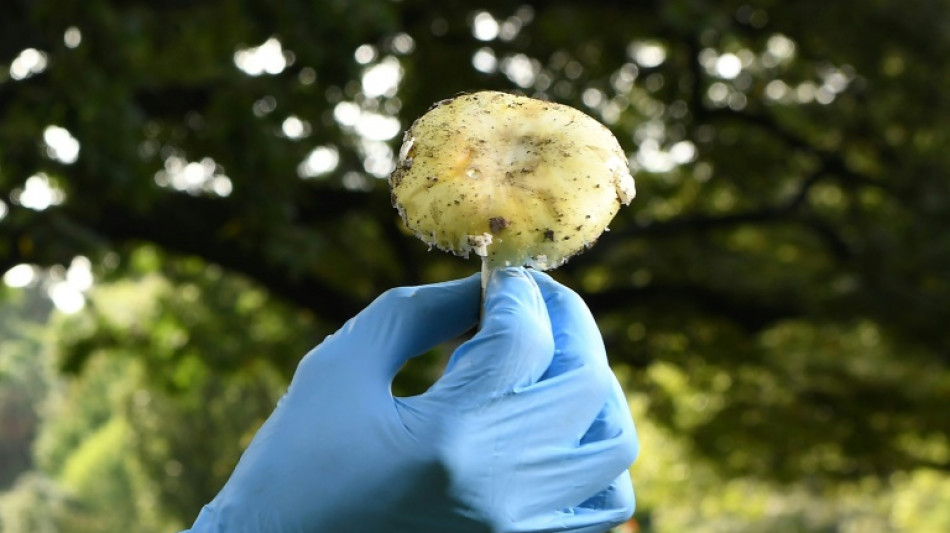
-
 Iran, US hold new round of high-stakes nuclear talks
Iran, US hold new round of high-stakes nuclear talks
-
Up at dawn for front-row seat to history at Francis's funeral

-
 Pakistan ready to 'defend sovereignty' after India threats
Pakistan ready to 'defend sovereignty' after India threats
-
Huge crowds flock to Vatican for Pope Francis's funeral

-
 Xi says China must 'overcome' AI chip challenges
Xi says China must 'overcome' AI chip challenges
-
Indian army says new exchange of gunfire with Pakistan

-
 Epstein accuser Virginia Giuffre takes own life in Australia: family
Epstein accuser Virginia Giuffre takes own life in Australia: family
-
Hundreds of buildings damaged, dozens injured in 6.3 Ecuador quake

-
 India and Pakistan's Kashmir fallout hits economy too
India and Pakistan's Kashmir fallout hits economy too
-
Francis's funeral to be grand farewell to 'pope of the poor'

-
 Pogacar faces defiant Evenepoel at Liege-Bastogne-Liege
Pogacar faces defiant Evenepoel at Liege-Bastogne-Liege
-
Chelsea eye great escape against Barcelona in Women's Champions League

-
 Iran, US to hold new round of high-level nuclear talks
Iran, US to hold new round of high-level nuclear talks
-
'Energy and effort' pay off for Reds as Blues' woes continue

-
 Albatross and closing birdie lift China's Liu to LPGA Chevron lead
Albatross and closing birdie lift China's Liu to LPGA Chevron lead
-
On the horizon? Wave of momentum for high seas treaty

-
 Top Mistakes to Avoid When Building Credit History
Top Mistakes to Avoid When Building Credit History
-
Developing countries should fast-track US trade deals: World Bank president

-
 Grizzlies' Morant 'doubtful' for must-win game 4 v Thunder
Grizzlies' Morant 'doubtful' for must-win game 4 v Thunder
-
Trump in Rome for pope funeral in first foreign trip of new term

-
 Trump says Russia-Ukraine deal 'very close' after new Kremlin talks
Trump says Russia-Ukraine deal 'very close' after new Kremlin talks
-
US rookies lead PGA pairs event with McIlroy and Lowry in hunt

-
 Trump tariff promises get a reality check
Trump tariff promises get a reality check
-
Warriors coach Kerr 'relatively optimistic' injured Butler will play game 3

-
 Postecoglou hopes 'Stonecutter's Credo' can inspire Spurs
Postecoglou hopes 'Stonecutter's Credo' can inspire Spurs
-
PSG lose unbeaten Ligue 1 record ahead of Arsenal showdown

-
 Venezuela accuses El Salvador president of 'human trafficking'
Venezuela accuses El Salvador president of 'human trafficking'
-
Own goal takes Sundowns to African final against Pyramids

-
 Scores of buildings damaged, 20 injured in Ecuador quake
Scores of buildings damaged, 20 injured in Ecuador quake
-
US stocks extend rally as market eyes busy calendar next week

-
 Pope's death triggers surge of disinformation he fought against
Pope's death triggers surge of disinformation he fought against
-
Rovanpera takes control of Rally Islas Canarias

-
 Zelensky insists Crimea is Ukrainian as US envoy meets Putin
Zelensky insists Crimea is Ukrainian as US envoy meets Putin
-
Patel and Mendis help Sunrisers beat Kings in Dhoni's 400th T20

-
 Copa del Rey ref statements 'unacceptable': Real Madrid after boycotting final build-up
Copa del Rey ref statements 'unacceptable': Real Madrid after boycotting final build-up
-
Insurance CEO's accused killer pleads not guilty to federal murder charges

-
 FBI arrests Wisconsin judge for shielding undocumented migrant
FBI arrests Wisconsin judge for shielding undocumented migrant
-
Brazil ex-president Collor de Mello jailed for corruption

-
 Zelensky insists Crimea 'belongs' to Ukraine as US envoy meets Putin
Zelensky insists Crimea 'belongs' to Ukraine as US envoy meets Putin
-
Real Madrid boycott Copa del Rey build-up over referee complaints

-
 Trinidad and Tobago votes for parliament, PM, with opposition in lead
Trinidad and Tobago votes for parliament, PM, with opposition in lead
-
IMF chief hails 'constructive' Spring Meetings held under tariff uncertainty

-
 Iran FM Araghchi in Oman ahead of nuclear talks with US
Iran FM Araghchi in Oman ahead of nuclear talks with US
-
Dozens of buildings destroyed, 20 injured in Ecuador quake

-
 Young Barca must 'enjoy' Real Madrid Copa final fight: Flick
Young Barca must 'enjoy' Real Madrid Copa final fight: Flick
-
Pakistan and India border closure separates families

-
 Brazil's Bolsonaro 'stable' after post-surgery setback
Brazil's Bolsonaro 'stable' after post-surgery setback
-
Catholics in secular Cuba hail Francis as 'bridge'

-
 US envoy Witkoff, Putin discuss 'possibility' of direct Russia-Ukraine talks
US envoy Witkoff, Putin discuss 'possibility' of direct Russia-Ukraine talks
-
Community seeks answers after French school knife killing


Possible antidote discovered for deadliest mushroom: study
Researchers said on Tuesday that an already widely used medical dye reduces the poisonous effects of death cap mushrooms in mice, raising hopes of the first targeted antidote for the world's deadliest mushroom.
The China-led team said the dye, which has yet to be tested as an antidote on humans but has already been approved by the US Food and Drug Administration (US FDA) for other uses, has the potential to "save many lives".
Amanita phalloides, commonly known as death caps, are estimated to cause more than 90 percent of all deaths from mushroom poisoning worldwide.
They often resemble other species of mushrooms that people like to pick in the wild -- but eating just half of one can cause deadly failure of the liver or kidneys.
While originally native to Europe, death caps have spread across the world, causing more than 38,000 illnesses and nearly 800 deaths in China alone between 2010 and 2020.
For a new study published in the journal Nature Communications, the researchers sought to target alpha-amanitin, the main toxin produced by the mushrooms.
They used genome-wide CRISPR screening, a relatively new technique that has helped researchers understand the role specific genes play in infections and poisonings.
The team had previously used the technology to find a potential antidote for the box jellyfish, one of the world's most venomous animals.
The CRISPR screening identified that the protein STT3B was a key culprit in the toxic effects of death cap poisoning.
The team searched through a database of drugs already approved by the US FDA and found one that could potentially block the protein.
- 'Unexpected connection' -
It is a fluorescent dye called indocyanine green, which is administered intravenously. It has been widely used for decades in the US, Europe and elsewhere for diagnostic imaging, allowing doctors to measure liver and heart function.
Qiaoping Wang, a researcher at China's Sun Yat-sen University and senior author of the study, told AFP that "upon discovering this unexpected connection, the research team was understandably taken aback".
The team tested the antidote first on liver cells in a petri dish, then on mice.
In both cases, it "demonstrated significant potential in mitigating the toxic impact" of mushroom poisoning, Wang said.
"This molecule holds immense potential for treating cases of human mushroom poisoning and could mark the first-ever specific antidote with a targeted protein," he said.
"It could save many lives if it is as effective in humans as in mice."
The team now intends to conduct trials on humans using the dye as a death cap antidote.
An extract from milk thistle seeds called silibinin has previously been used to treat death cap poisoning, but exactly how it works has remained unclear.
L.Harper--AMWN


